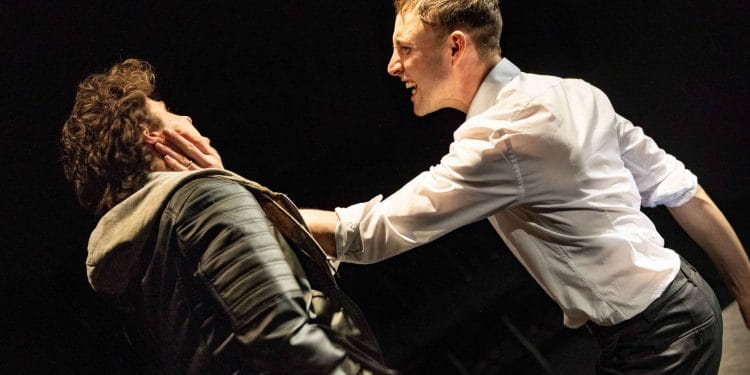 Lidless Theatre, and director Max Harrison, are developing quite the reputation for staging outstanding small space revivals of the work of Philip Ridley. Most recently it was Tender Napalm at the King’s Head and now it’s the second of Ridley’s ‘Brother Trilogy’, Leaves of Glass, playing in the intimate Park Theatre studio space.
Lidless Theatre, and director Max Harrison, are developing quite the reputation for staging outstanding small space revivals of the work of Philip Ridley. Most recently it was Tender Napalm at the King’s Head and now it’s the second of Ridley’s ‘Brother Trilogy’, Leaves of Glass, playing in the intimate Park Theatre studio space.
First seen at the Soho Theatre back in 2007, this one act play delves head first into family trauma in a way that only Ridley could achieve. The fact that it’s staged in such a small space is vitally important because it immediately reinforces the sense of claustrophobia that can often be felt within a family unit.
Kit Hinchcliffe’s streamlined set design further emphasises this feeling; performed in-the-round, four black benches are all the actors have to work with, set atop a highly polished floor which becomes ever dirtier and scuffed as the play progresses.
The family relationship also deteriorates throughout Leaves of Glass, as we watch two brothers, Steve and Barry, come to terms with their traumatic childhood. Steve is successful with enough money to keep the whole family comfortable – a result of running a successful graffiti cleaning company in East London. Younger brother Barry is an alcoholic, and an artist that has struggled to find success, relying on Steve’s generosity and employment.
But as Steve and Debbie find out they are to have a baby; things start to change. Perhaps there’s success on the horizon for Barry, and maybe things are unravelling for Steve. The secrets of the past are revealed slowly, and Max Harrison wrings that dramatic tension for all it’s worth, leaving the audience leaning forward in their seats as they become gripped by what’s unfolding (literally) right in front of them.
The death of their father has clearly affected the brothers, and their relationship with not only each other, but also their mother Liz, a straight talking East End woman who is convinced she’s holding the family together, when in reality she’s ignoring what’s painfully obvious to the rest of us. Kacey Ainsworth’s gloriously forthright performance leaves the audience wondering whether to love or hate this particular matriarch.
When the family aren’t staying silent, they are gaslighting each other, carefully remembering only certain details of events and trying to convince each other that their version is what really happened. It’s mostly a tense and dramatic evening, though there are lighter moments, often from Katie Bucholz’s Debbie.
But the real meat of the narrative comes from the interactions of the brothers, climaxing in a superbly staged scene set in a candlelit cellar. Joseph Potter is exquisite as Barry, initially painted in anguish, Potter slowly and meticulously transforms the character until that final scene when the audience is hanging on every word.
Ned Costello leads the cast in a triumphant performance. On stage throughout, Costello never misses a beat, the portrayal of Steve is exacting, especially in the later scenes when history appears to be repeating itself and the ‘fluey-bug thing’ once again torments this family.
Again, Lidless Theatre prove that their reputation for presenting Ridley’s modern classics is completely justified. With a gripping story, outstanding cast and inspired staging, this production of Leaves of Glass is theatre as it should be – an unforgettable experience.

















